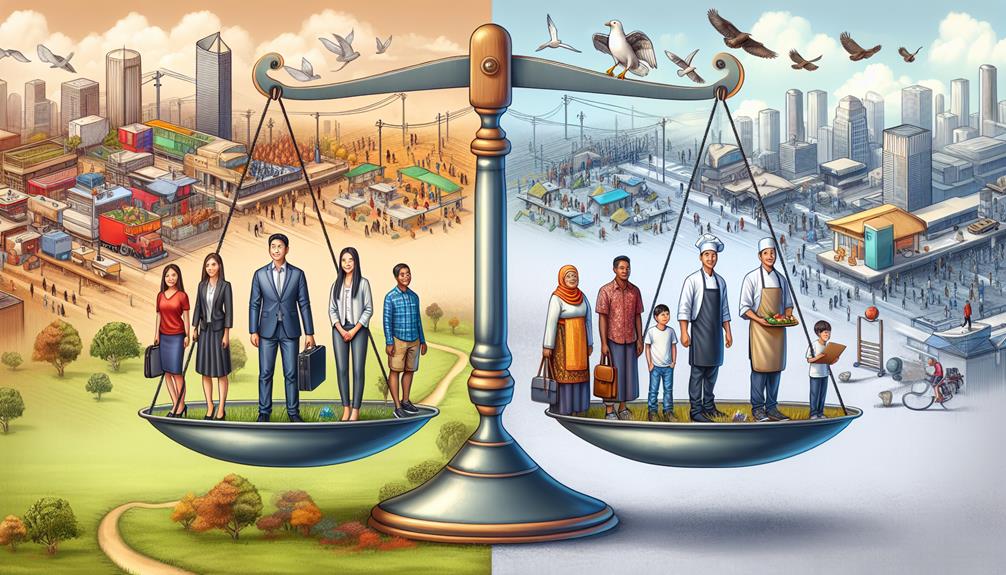You’ve probably heard of Sci-Hub, the controversial website that allows users to download research papers for free. It’s hailed as a hero by some in the academic community for its role in democratizing access to information. However, you might be overlooking the complex ethical and legal issues it presents. As you consider the implications of using such a service, think about the broader impact on the authors, publishers, and the sustainability of scholarly communication. What are the consequences of circumventing traditional academic publishing? Let’s unpack these issues further.
Introduction
You may find yourself wondering why a platform like Sci-Hub, which provides free access to academic articles, seems to be overlooked.
It’s important to examine how this portal challenges the traditional barriers in academic publishing.
Understanding the implications of unrestricted access to knowledge is essential for evaluating the broader impacts on research and education.
Overview of Sci-Hub
Sci-Hub, a controversial online repository, provides free access to millions of research papers that are otherwise locked behind paywalls. Founded by Alexandra Elbakyan from Kazakhstan in 2011, it’s been called a lifeline for those unable to afford the high costs of academic journals. You might see it as a Robin Hood of the modern academic world, taking from the privileged few to give to the many who lack resources.
The platform works by bypassing the subscription barriers of publishers. When you request a paper from Sci-Hub, it uses various methods to retrieve a pirated PDF if it doesn’t already exist in its database. The repository has grown substantially, reportedly containing over 85 million academic papers and serving tens of millions of requests each day.
Critics argue that Sci-Hub undermines the economics of the publishing industry, potentially affecting the quality of future publications. Meanwhile, advocates assert that it democratizes access to knowledge essential for scientific advancement and educational equality. This tension highlights a broader debate about access to scientific research and the ethics of information sharing in the digital age.
Importance of Free Articles Access
You’ve likely noticed that accessing scholarly articles can be a major hurdle in academic research and study. Free access to these resources, as facilitated by platforms like Sci-Hub, greatly aids researchers and students who might otherwise be blocked by paywalls.
This unrestricted availability not only accelerates academic progress but also democratizes knowledge across diverse socioeconomic backgrounds.
Benefits for Researchers and Students
Access to free academic articles greatly empowers researchers and students, enhancing their ability to contribute to their fields. You’ll find that unrestricted access to resources removes financial barriers, democratizes information, and fosters innovation.
It accelerates your research process, allows for a broader exploration of existing knowledge, and supports high-quality learning experiences. This access is vital for advancing global academic dialogue and scientific progress.
Legal Implications
You must consider the significant legal implications that come with using Sci-Hub. Copyright infringement issues are at the forefront, as the platform provides access to copyrighted materials without authorization.
Furthermore, recent legal battles highlight the ongoing conflict between copyright laws and the accessibility of scientific knowledge.
Copyright Infringement Issues
While Sci-Hub provides unrestricted access to scholarly articles, it also raises significant legal issues related to copyright infringement. You’re maneuvering through a complex landscape where the line between information accessibility and respect for copyright laws blurs.
Sci-Hub operates on the premise that knowledge should be freely available, but this clashes with the legal frameworks that protect the intellectual property of authors and publishers.
As you explore further, you’ll find that copyright laws are designed to safeguard the rights of creators to control and receive compensation for their work. By bypassing paywalls, Sci-Hub disrupts this balance, potentially undermining the incentive for publishers to invest in and disseminate scholarly work. This isn’t just about legality; it’s about the sustainability of the publishing industry and the broader implications for innovation and academic integrity.
Moreover, you must consider the potential repercussions for users. Engaging with Sci-Hub can expose you to legal risks, including lawsuits from publishers defending their copyrights. Each download from Sci-Hub carries with it a shadow of legal uncertainty, complicating the ethical landscape of academic resource sharing.
As you navigate this terrain, it’s important to weigh the benefits of access against the risks of infringement.
Recent Legal Battles
It’s crucial to consider the legal challenges Sci-Hub faces and how they’ve influenced the academic publishing industry. These battles highlight significant shifts in access to scholarly materials, raising questions about copyright laws and their enforcement in digital spaces.
Examining how these conflicts could reshape the landscape of academic research and publishing is imperative.
Impact on Academic Publishing Industry
Sci-Hub’s legal entanglements have greatly disrupted the traditional academic publishing industry, challenging established copyright norms and operations. You’re seeing publishers bolster legal strategies and alter access models in response.
This shift isn’t just about protecting content; it’s reshaping how knowledge is disseminated.
While some view Sci-Hub as a threat, others see it as a catalyst for necessary change in scholarly communication.
Ethical Considerations
As you contemplate the ethical landscape surrounding Sci-Hub, it’s essential to weigh the tension between the free access to information and the rights of copyright holders. You must question whether the use of Sci-Hub aligns with or contradicts your personal and professional ethical standards.
This debate not only affects individual users but also shapes the broader discourse on intellectual property and digital rights.
Debate on Information Access vs. Copyright Protection
Many argue that unrestricted access to information is a fundamental right, yet it clashes with the principles of copyright protection that incentivize creativity and innovation. You’re caught in the middle of this debate whenever you search for academic articles or creative content.
This conflict isn’t just a minor legal skirmish; it’s a profound ethical dilemma involving access to knowledge and the sustenance of those who create it.
On one hand, you might feel that everyone deserves access to information, especially in academic and scientific fields where knowledge can lead to significant societal benefits. However, the other side of the argument can’t be ignored.
Copyrights aren’t merely legal tools; they’re incentives for creators. They support that authors, artists, and researchers can earn a livelihood from their creations. Without such protections, the motivation to create new works or conduct groundbreaking research might diminish.
Think about it: if every piece of information was free, how would creators sustain themselves? Yet, if access is too restricted, how can society progress?
Striking a balance here is essential, but it’s also challenging. As you navigate through this complex issue, consider both the immediate benefits of open access and the long-term impacts on creative output.
Ethical Use of Sci-Hub
You need to weigh the ethical implications of using Sci-Hub, considering both its potential to democratize knowledge and the potential harm to copyright holders. It’s not a simple matter of right or wrong. Here’s what you should consider:
- Access vs. Ownership: Sci-Hub provides free access to a vast range of scientific papers, many of which are behind expensive paywalls. This is important for researchers in developing countries and for independent scholars who can’t afford these fees. However, it bypasses the legal acquisition of these documents, infringing on copyright laws designed to protect the intellectual property of authors and publishers.
- Impact on the Publishing Industry: The traditional publishing model relies on subscriptions and sales to fund the peer review and dissemination of scholarly work. By circumventing this model, Sci-Hub could be undermining the financial viability of the publishing sector, potentially affecting the quality and sustainability of academic publishing.
- Long-term Consequences for Research: If publishers lose revenue, the funding for professional editing, distribution, and academic integrity might dwindle, possibly degrading the quality of future publications.
Balancing these factors isn’t straightforward. You’re faced with a choice between immediate access to knowledge and supporting an ecosystem that guarantees the quality and availability of future research.
Future of Free Article Access
As you explore the landscape of free article access, it’s important to examine how technological innovations might reshape the way research is accessed.
You should also assess potential solutions for open access publishing that balance the needs of publishers and the academic community.
Technological Innovations in Accessing Research
In the domain of academic research, technological innovations are rapidly transforming how free article access is facilitated. You’re witnessing a shift that could redefine the landscape of how knowledge is shared and consumed globally.
Here’s a breakdown of the key technological advances:
- Blockchain Technology: This isn’t just for cryptocurrencies. Blockchain could potentially decentralize the control of academic publications, guaranteeing transparency and accessibility. It’s a ledger where transactions are recorded and confirmed anonymously. Imagine a world where research outputs are freely accessible on a blockchain platform, without intermediaries.
- Artificial Intelligence (AI): AI is streamlining the discovery of relevant academic articles. Algorithms can now predict the most relevant papers based on your past searches and readings. This personalization not only speeds up your research process but also cuts through the noise of countless publications.
- Cloud-Based Platforms: These platforms are making it easier than ever to store, share, and access academic papers. With high-capacity servers and enhanced security measures, these platforms ensure that research is both accessible and protected from unauthorized use.
These innovations are shaping a future where free access to academic articles could become the norm rather than the exception, profoundly impacting educational and professional landscapes alike.
Potential Solutions for Open Access Publishing
Building on technological innovations, exploring potential solutions for open access publishing is the next step toward democratizing academic research.
As you engage with this evolving landscape, you’ll find that tiered pricing models stand out as a promising approach. These models adjust subscription fees based on the economic strength of the institution, making research accessible to a wider audience without compromising the sustainability of publishing houses.
Another significant solution is the development of author processing charges (APC) subsidies. This strategy involves academic institutions or funding bodies covering the costs for researchers, ensuring that financial barriers don’t hinder the dissemination of knowledge. It’s important to recognize the role of government and institutional grants in supporting these subsidies, which can make open access publishing feasible for more researchers.
Additionally, you should consider the potential of consortia agreements. By banding together, libraries and institutions can negotiate better deals with publishers, reducing individual costs and expanding access. These agreements not only support widespread access but also leverage collective bargaining to shape more equitable publishing practices.
As you look forward, remember that each of these solutions requires careful implementation to balance the interests of all stakeholders involved in the scholarly communication system.
Collaboration between Publishers and Researchers
Collaboration between publishers and researchers can revolutionize the future of free article access by fostering innovative sharing models. As you navigate the evolving landscape of academic publishing, you’ll find that synergy between these two groups is vital for developing sustainable open access frameworks. This collaboration not only benefits the scientific community but also enhances public engagement with research.
Here are three key strategies where publishers and researchers can work together effectively:
- Development of Shared Platforms:
By co-creating platforms where researchers can publish their findings openly, and publishers can maintain quality control and peer review processes, both parties leverage their strengths. This reduces redundancy and increases the visibility of research.
- Adoption of Transparent Peer Review Models:
Transparent peer review processes help in maintaining the integrity of published research. Publishers can provide the infrastructure while researchers bring authenticity and thorough evaluation into the process.
- Implementation of Fair Pricing Models:
Establishing pricing models that consider the financial constraints of academic institutions and researchers can lead to more equitable access to information. This approach ensures that financial barriers don’t impede the dissemination of knowledge.
As you engage more deeply with these models, you’ll see how effective collaboration can lead to a more accessible and equitable academic publishing ecosystem.




